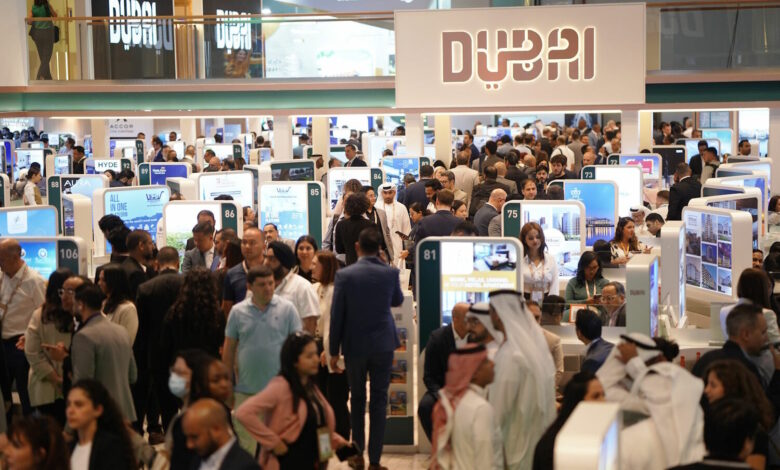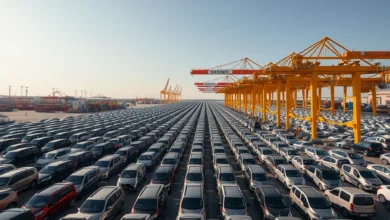
The Intersection of Slow Travel, Sustainability, and Technology in Shaping Tourism
The Arabian Travel Market (ATM) 2024, currently unfolding in Dubai until May 9, sets a global stage for the evolving dynamics of tourism, emphasizing slow travel, sustainability, and technology. This convergence is spotlighting emerging trends like immersive travel experiences and slow travel tours, reshaping how tourists engage with their destinations. With over 40,000 attendees anticipated, the ATM 2024, themed “Empowering Innovation: Transforming Travel Through Entrepreneurship,” becomes a pivotal point in understanding these shifts, particularly how slow travel destinations and homestay opportunities are being redefined through innovation.
As the event unfolds at the Dubai World Trade Centre, featuring interactive discussions and keynotes on future global tourism trends, it underscores the significance of sustainability in tourism and the technology accelerating it. Slow travel experiences, aimed at encouraging more purposeful travel, are gaining traction, driven by consumer preferences for deeper, more immersive travel experiences. The ATM 2024 not only highlights the slow travel trend but also how technological advancements like AI and data analytics are crafting the future of global tourism, making it an essential gathering for those eager to witness the intersection of slow travel, sustainability, and technology in tourism.
Understanding Slow Travel
Slow travel, a term resonating with the desire for more meaningful and immersive travel experiences, stands as a response to the fast-paced, often superficial tourist activities. It emphasizes a deeper connection with the places visited, focusing on quality over quantity. Here are some of the core aspects that define slow travel:
- Community and Economic Benefits: Slow travel supports local economies by directing spending towards local businesses, reducing economic leakage which is common in mass tourism. This approach not only helps preserve cultural heritage but also ensures that tourism benefits are widely distributed within the community.
- Environmental Impact: Advocating for eco-friendly modes of transportation such as walking, cycling, and train travel, slow travel significantly lowers the carbon footprint compared to conventional air travel and private vehicles. This is crucial in combating the global challenge of climate change.
- Cultural Immersion: By spending more time in fewer places, slow travelers engage deeply with local cultures, cuisines, and traditions. This not only enriches the travel experience but also fosters respect and appreciation for diverse cultures.
- Personal Growth: Slow travel allows individuals to explore destinations at their own pace, encouraging self-reflection and a deeper connection with both the environment and the local communities. This more relaxed pace helps travelers to unwind and absorb their surroundings more fully.
- Sustainability: Tied closely with the principles of the Slow Food movement, which advocates for local food production and consumption, slow travel promotes sustainability through a reduction in quick consumption and a focus on enduring experiences.
By integrating these elements, slow travel offers a thoughtful, fulfilling alternative to the often-hectic schedules of traditional tourism, making it a compelling choice for those seeking a more profound connection with the world.
The Importance of Sustainability in Tourism
Sustainability in tourism is not just a trend but a necessity, as it addresses both the environmental impacts and the socio-economic benefits essential for long-term viability. Here are the key aspects of sustainable tourism:
Environmental and Socio-cultural Sustainability
- Environmental Protection: Sustainable tourism practices include minimizing impacts on natural resources, reducing pollution, and conserving biodiversity. This involves using sustainable fuels, promoting renewable energy in the hospitality industry, and adhering to low-carbon travel options.
- Cultural Preservation: Ensuring that tourism does not erode cultural heritage but instead promotes and preserves it is crucial. This includes supporting local crafts, traditions, and languages, which enrich the travel experience and foster global respect and understanding.
Economic Benefits
- Supporting Local Economies: Sustainable tourism contributes to local economies by creating jobs that do not rely on outsourced labour and by sourcing goods and services locally.
- Fair Economic Distribution: It ensures that the economic benefits derived from tourism are well-distributed among the community, preventing the concentration of wealth in the hands of a few.
Community and Personal Benefits
- Community Empowerment: By involving local communities in tourism planning and decision-making, sustainable tourism increases community capacity and pride.
- Enhanced Visitor Experience: Tourists benefit by having more meaningful, educative, and authentic experiences, which in turn increases visitor satisfaction and the likelihood of return visits.
Advocacy and Education
- Promoting Awareness: Educating tourists about the importance of sustainability practices helps cultivate responsible behaviour that extends beyond their travel experiences.
- Policy Advocacy: Travelers and businesses can advocate for policies that promote sustainable tourism practices, ensuring that tourism development benefits both the environment and the communities.
Implementing these practices not only mitigates the negative impacts of tourism but also enhances its positive effects, making it a pivotal aspect of global travel that respects our planet and its inhabitants.
Technological Innovations Shaping Tourism
Artificial Intelligence (AI) is revolutionizing the tourism industry by enhancing operational efficiency and enriching the traveller’s experience. Here are keyways AI is shaping tourism:
AI-Powered Chatbots and Virtual Assistants
- Personalized Travel Recommendations: AI chatbots analyse user data to tailor travel suggestions, aligning with individual preferences.
- Virtual Travel Guides: These AI-driven tools provide real-time information on local attractions, events, and dining, acting as on-demand travel advisors.
- Customer Service Enhancements: AI virtual assistants offer round-the-clock assistance, improving service responsiveness and efficiency.
Advanced AI Applications
- Facial Recognition and Security: Implemented at airports, these systems streamline security processes, enhancing safety and traveller convenience.
- Dynamic Travel Packages: AI algorithms process real-time data on flights, hotels, and events to assemble customized travel packages.
- Revenue Management: AI-driven systems dynamically adjust pricing based on demand, competitor actions, and customer segmentation to optimize revenue.
The Role of AI in Operational and Customer Experience Improvements
- Efficient Booking Processes: AI simplifies booking, offering options that best meet traveller needs, from flights to accommodations.
- Enhanced Communication: AI-powered translation tools help overcome language barriers, making travel more accessible and enjoyable for international tourists.
- Predictive Analytics: Utilized for demand forecasting, helping agencies refine pricing strategies and manage resources more effectively.
AI’s impact on tourism is profound, offering tools that not only streamline operations but also significantly enhance the overall travel experience, making it more personalized and accessible.
The Rise of AI and Data Analytics in Travel
AI and data analytics are increasingly becoming indispensable in the travel and hospitality sectors. These technologies are not just enhancing the customer experience but are also instrumental in streamlining operations and boosting efficiency. Here’s how AI is making its mark:
AI-Powered Tools and Applications
- Customer Interaction: AI tools are being employed to handle everything from answering basic queries to providing personalized travel recommendations. This not only improves customer satisfaction but also significantly reduces operational costs.
- Content Generation: Advanced AI applications can generate comprehensive articles or blog posts, further aiding in marketing and customer engagement without requiring constant human input.
Enhancing Travel Experiences
- Personalization: AI excels in analysing large datasets to offer tailored travel experiences to individuals, enhancing satisfaction and engagement.
- Booking and Management: AI technologies streamline the booking process, making it more efficient and user-friendly. They also assist in managing bookings and customer data, ensuring a smooth travel planning experience.
Strategic Implementation for Futureproofing
- Operational Efficiency: Integrating AI helps in optimizing resource management and pricing strategies, which is crucial for maintaining competitiveness in the travel industry.
- Data-Driven Decisions: The use of data analytics in travel helps businesses make informed decisions that align with consumer needs and market trends, ensuring long-term sustainability.
By leveraging AI and data analytics, travel and hospitality businesses are not only enhancing the immediate travel experience but are also setting the stage for a more robust and resilient industry. This strategic adoption of technology ensures that businesses remain adaptable and competitive, catering effectively to the evolving demands of modern travelers.
Consumer Preferences Driving Change
Personal and Social Influences on Travel Choices
- Personal Factors: Travelers’ choices are deeply influenced by personal factors such as age, lifestyle, and profession. These elements shape their travel preferences, whether they lean towards adventure, cultural immersion, or wellness retreats.
- Social Factors: The influence of culture, family, and social circles cannot be understated. These factors dictate not just destination choices but also the type of experiences travelers seek, from family-friendly vacations to solo backpacking adventures.
Economic and Situational Influences
- Economic Factors: Economic conditions play a crucial role, as income levels and economic stability affect how much consumers are willing to spend on travel. Economic factors also influence the timing and type of travel, whether it is luxury escapes or budget-friendly road trips.
- Situational Factors: Immediate contexts like time availability, physical and social ambiance, and even mood can dictate travel decisions. For instance, a long weekend might spur a spontaneous local getaway, while a festive season might prompt international travel.
Emerging Trends in Consumer Preferences
- Immersive Experiences: There is a growing demand for authentic interactions with local cultures, which goes beyond traditional sightseeing. Travelers are looking for experiences that allow them to live like locals.
- Personalization in Tourism: More travelers now expect their journeys to be tailored to their preferences, from accommodation to activities, reflecting a shift towards more personalized travel services.
- Culinary Tourism and Niche Travel: Interest in culinary tourism is rising, with travelers eager to explore destinations through their gastronomic offerings. Similarly, passion-focused niche travel is becoming popular, catering to specific interests like art, music, or sports.
The Rise of Bleisure and Wellness Tourism
- Bleisure Travel: The blending of business and leisure travel is a significant trend, especially with the increase in remote working. Travelers are extending business trips to include leisure activities, exploring new destinations while on work assignments.
- Wellness Tourism: As health and well-being take centre stage in consumer lives, wellness tourism is seeing an uptick. This trend includes travel focused on mental and physical rejuvenation, such as spa visits, yoga retreats, and nature-centric stays.
These consumer preferences are driving significant changes in the tourism industry, pushing for more innovative, personalized, and sustainable travel options.
The Future of Global Tourism
The future of global tourism is poised for transformative shifts, driven by technological advancements, and changing consumer behaviours. Key trends include the digitalization of travel experiences and the rise of space tourism, reflecting a broader integration of innovative technologies in the tourism sector.
Digital and Interactive Travel Experiences
As the digital environment evolves, tourists are increasingly seeking interactive and immersive travel experiences. Platforms that offer digital recreations of destinations allow travelers to explore and interact with others virtually. This not only enhances the travel experience but also opens new possibilities for those unable to travel physically.
Integration of Blockchain Technology
The use of Non-Fungible Tokens (NFTs) is redefining ownership and value in the tourism industry. NFTs serve as digital assets on the blockchain, representing unique items like artwork or exclusive travel experiences. They are becoming instrumental in powering customer loyalty schemes and fostering partnerships with local artists, adding a new layer of engagement and investment in travel.
Economic Impact and Market Growth
The travel and tourism sector’s contribution to the global GDP is significant and growing. With a projected annual growth rate of 3.1%, the sector’s influence on the global economy is expected to increase notably. This growth is supported by a rebound in international tourist arrivals and the expanding market size, which is anticipated to constitute a 10% share of the global economy by 2025.
The Advent of Space Tourism
Space tourism is emerging as a fascinating frontier in the travel industry. Offering trips beyond Earth, this trend not only captivates the imagination but also marks a significant milestone in the expansion of tourism domains. As technology advances, space travel is set to become a unique and futuristic experience available to the wider public.
These evolving dynamics underscore a period of rapid innovation and adaptation in global tourism, promising a future where travel is more accessible, interactive, and enriched with new technological dimensions.
Throughout this analysis, we have explored the intricate relationship between slow travel, sustainability, and technology as significant forces reshaping the tourism industry. By delving into the various aspects of these trends, from the principles of slow travel that emphasize deep, meaningful connections with destinations to the role of technology in enhancing and personalizing travel experiences, we have uncovered how these elements collectively foster a more sustainable, enriching travel culture. These discussions not only highlight the evolving preferences of travelers towards more immersive and eco-conscious travel experiences but also emphasize the critical role of technological innovations in meeting these demands efficiently.
As the tourism sector stands at the cusp of transformation, spurred by these key trends, it is imperative to recognize the broader implications of our findings. The integration of slow travel, sustainability, and technological advancements is not just redefining traveller experiences but also contributing significantly to the economic, social, and environmental sustainability of tourism on a global scale. The insights gathered from the Arabian Travel Market 2024 underscore a promising future for the industry, encouraging further exploration and adoption of these practices. By continuing to navigate this intersection, businesses, consumers, and communities alike can ensure the longevity and prosperity of tourism as a valuable global endeavour.







[…] Labor Accommodation […]
[…] Tourist Awareness Campaigns […]
[…] detailed guide shows how DNA testing changes heritage tourism. It provides practical tips to plan meaningful ancestral trips, build local community connections, […]